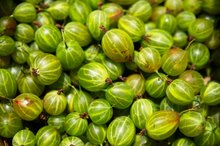Medicinal Uses of Carnations
Plants, flowers and herbs have been used for thousands of years for medicinal purposes, with effective results. Flowers, from petals to roots, offer a variety of components and ingredients that may provide relief from pain, swelling and infection. Some flowers, such as carnations, have been used in the treatment of a variety of ills, from acting as a stimulant to an antispasmodic.
Stress
Carnations, also known as Dianthus caryophyllus, have long been brewed into teas that may help alleviate stress and nervousness. Carnations grown, cultivated and dried into tea brews have also been used to treat minor depression and fatigue.
In Europe, folk medicine relied on infusions or teas brewed of carnations to help relieve nervousness and some coronary disorders, as well as for nausea caused by seasickness.
In massage oils, carnations have been used to promote healing of the skin and to increase vitality that not only softens and replenishes the skin, but creates a scent that many find soothing and calming.
In ancient China, carnation flower tea was widely used to help the body and spirit relax, and to restore energy in the body.
- Carnations, also known as Dianthus caryophyllus, have long been brewed into teas that may help alleviate stress and nervousness.
Inflammation
What Are the Benefits of Passion Flower for Menopausal Women?
Learn More
Carnations have also been used in the treatment of endometriosis, which is excessive growth of endometrium tissues that normally grow only in the uterus, but may also proliferate in other pelvic organs such as the ovaries and fallopian tubes. In such cases, carnation tea or supplements have been used to relieve stress, anxiety and insomnia in those with hormone imbalances, which contribute to endometriosis, as well as other side effects of endometriosis, such as constipation, caused by excess tissue or scarred tissues in the pelvic region.cause:
- In such cases
- carnation tea or supplements have been used to relieve stress
- anxiety
- insomnia in those with hormone imbalances
- which contribute to endometriosis
- as well as other side effects of endometriosis
- such as constipation
- caused by excess tissue or scarred tissues in the pelvic region
Skin
Carnation oils have therapeutic benefits for the treatment of skin rashes and act like a conditioner for the skin 1. Many women use carnation oil to treat and minimize the appearance of facial wrinkles and conditions such as rosacea and eczema. The flower has been used in a variety of cosmetics and oils as well.
Nausea
Sage Tea for Sweating
Learn More
Carnations have been used in medicine to help reduce fevers and stomach aches, in addition to enhancing liver, stomach and heart health. In "Pharmacopoeia Londinensis," a 1618 publication of a pharmaceutical book, the carnation was used in tonic cordials or hot drinks to help fight fevers and fight against germs and pestilence.
Homeopathic Remedies
According to some ancient Aztec homeopathic remedies, carnations were used by this Indian culture as a diuretic when taken in an infusion of carnation flower petals in hot water. The ancient Indian tribe also used carnations for treatment and relief of chest congestion and diseases by taking about 1 tbsp. of the flower petals mixed with sugar and boiled in a syrup every three hours.
Related Articles
References
Writer Bio
Denise Stern is an experienced freelance writer and editor. She has written professionally for more than seven years. Stern regularly provides content for health-related and elder-care websites and has an associate and specialized business degree in health information management and technology.









